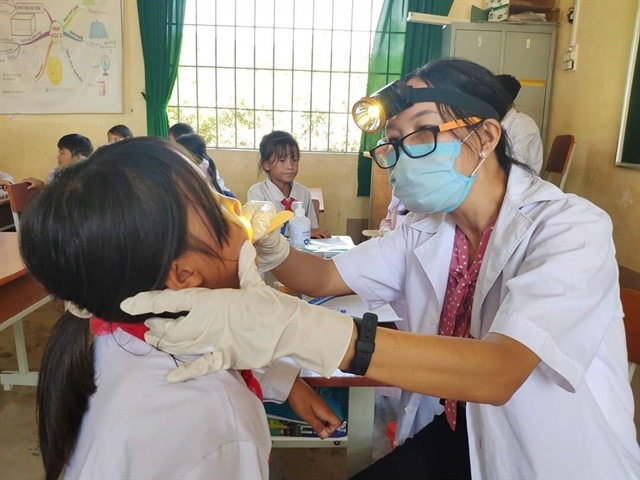 Society
Society
Children need four diptheria shots
The General Department of Preventive Medicine has urged parents to be sure their children have a total of four diptheria vaccine shots taken at the proper times.
 |
| Dr. Hoàng Minh Đức, Director of the Department of Preventive Medicine at the Ministry of Health. — Photo nhandan.vn |
Since the start of the year, Việt Nam has seen diphtheria cases in some localities. In response to public concerns about the potential for widespread transmission, Dr Hoàng Minh Đức, Director of the Department of Preventive Medicine at the Ministry of Health (MoH), said that the current diphtheria situation this year remains manageable and the risk of a large-scale epidemic is minimal.
Since the beginning of 2024, our country has recorded some cases of diphtheria. How do you assess the current situation?
Last year, there were 57 infection cases and seven deaths. According to the infectious disease surveillance system, in the first months of this year, Việt Nam recorded six cases of diphtheria and one death.
Specifically, there were three cases in Hà Giang Province, one case and one death in Kỳ Sơn District, Nghệ An Province and two cases in Hiệp Hòa District, Bắc Giang Province.
There was a recent report of a suspected case of diphtheria in Lào Cai Province. However, the National Institute of Hygiene and Epidemiology tested the sample and found it negative for diphtheria.
Diphtheria is a vaccine-preventable disease and the vaccine has been used in our National Expanded Programme on Immunisation since 1985. This has created widespread immunity in the community and reduced the number of cases by hundreds of times compared to 1983, when there were about 3,500 cases.
In recent years, only some cases have been reported in areas with insufficient vaccination coverage, as the vaccination rate has not reached 100 per cent and small percentage of the population remains unvaccinated.
Outbreaks mainly occur in remote areas where the conditions for providing vaccines through the expanded programme are still difficult, creating immunisation gaps.
Diphtheria is not a new disease. There is a vaccine that provides community immunity. When a positive diagnosis is made, antibiotics and antitoxin serum are available for treatment.
Additionally, for those who have been in contact with positive cases, preventive measures include a single dose of penicillin or a seven to ten-day course of Erythromycin, which effectively prevents the disease.
The diphtheria situation so far is not complicated. The number of cases is low, the outbreaks are small and remain under control, and the risk of a large-scale epidemic is low.
Recently, there have been instances of many people being isolated after coming into contact with diphtheria patients. What are your thoughts on this?
Diphtheria can spread through respiratory droplets or direct contact with nasal or throat secretions from an infected person or carrier when they cough or sneeze.
Prime Minister Phạm Minh Chính has recently issued a directive regarding the enhancement of diphtheria prevention and control measures. The Ministry of Health has instructed the People's Committees of provinces and cities to strengthen surveillance, detect cases early, and thoroughly handle outbreaks to prevent the spread of the disease within the community.
We urge the provinces and cities to implement outbreak management and proactive disease prevention for the public as per MoH’s guidelines.
For those who have been in close contact with confirmed diphtheria cases, the MoH recommends self-monitoring of health, home isolation for fourteen days, and contacting health officials for guidance on detecting symptoms and taking preventive antibiotics. All close contacts within outbreak areas should take preventive antibiotics as per MoH’s guidelines.
Home isolation should only apply to those who have had close contact with confirmed diphtheria patients and should not be extended to other contacts as was done during the COVID-19 pandemic. We advise local authorities not to unnecessarily broaden isolation measures, which could cause undue worry and disrupt the lives of the public.
What recommendations do you have for the public in preventing and controlling diphtheria?
To proactively prevent and control diphtheria, the Department of Preventive Medicine advises the public to adhere to the following measures:
Ensure that children from two months to seven years old within the expanded immunisation programme receive the full and timely doses of vaccines containing diphtheria components of DPT-VGB-Hib, DPT to ensure immunity against the disease. If a dose of vaccine is delayed, it should be given as soon as possible.
Regularly wash hands with soap; cover your mouth when coughing or sneezing; maintain personal hygiene, including daily cleaning of the body, nose and throat; and limit contact with individuals who are infected or suspected of being infected.
Ensure homes, kindergartens and classrooms are well-ventilated, clean, and adequately lit.
If signs of diphtheria or suspected diphtheria appear, seek medical attention promptly for timely examination and treatment.
Residents in areas with outbreaks must strictly follow the preventive treatment and vaccination recommendations from health authorities. — VNS




